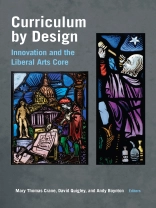This book tells the story of how a team of colleagues at Boston College took an unusual approach (working with a design consultancy) to renewing their core and in the process energized administrators, faculty, and students to view liberal arts education as an ongoing process of innovation. It aims to provide insight into what they did and why they did it and to provide a candid account of what has worked and what has not worked. Although all institutions are different, they believe their experiences can provide guidance to others who want to change their general education curriculum or who are being asked to teach core or general education courses in new ways.
The book also includes short essays by a number of faculty colleagues who have been teaching in BC’s new innovative core courses, providing practical advice about the challenges of trying interdisciplinary teaching, team teaching, project-or problem-based learning, intentional reflection, and other new structures and pedagogies for the first time. It will also address some of the nuts and bolts issues they have encountered when trying to create structures to make curriculum change sustainable over time and to foster ongoing innovation.
विषयसूची
Preface : Curriculum Revision and the Foundations of American Higher Education
David Quigley | xi
PART I: INNOVATION AND THE LIBERAL ARTS CORE | 1
Choreographing the Conversation: How Designers Helped Clear an Academic Logjam
William Bole | 3
What Do We Know? Or, The Perils of Expertise
Toby Bottorf | 13
Innovation
Andy Boynton | 21
Ambitious Plans Meet Reality: How We Made the Renewed Core Work
Mary Thomas Crane | 31
Slowing Down and Opening Up: Preparing Faculty to Co-design a General Education Course
Stacy Grooters | 41
Core Renewal as Creative Fidelity
Gregory Kalscheur, S.J. | 50
Reflection and Core Renewal
Jack Butler, S.J. | 62
Surprised by Conversation: A Reflection on Core Renewal at Boston College
Brian D. Robinette | 69
PART II: TEACHING THE RENEWED CORE | 73
Complex Problem Courses | 75
Teaching about a Planet in Peril
Prasannan Parthasarathi and Juliet B. Schor | 77
Experimenting with Science and Technology in American Society
Jenna Tonn | 82
Global Implications of Climate Change: Importance of Mentorship in a Core Education
Tara Pisani Gareau and Brian J. Gareau | 104
Enduring Question Courses: Bringing Together Divergent Disciplines | 115
How to Live in the Material World: Two Perspectives
Elizabeth Kowaleski Wallace and Dunwei Wang | 117
Aesthetic and Spiritual Exercises, in and beyond the Classroom
Daniel Callahan and Brian D. Robinette | 123
Enduring Question Courses: Differentiating Similar Disciplines | 133
Death in Ancient Greece and Modern Russia: Reflecting on Our Reflection Sessions
Hanne Eisenfeld and Thomas Epstein | 135
Spending a Semester with “A Possession for All Time”: Justice and War in Thucydides
Robert C. Bartlett | 144
Inquiring about Humans and Nature: Creativity, Planning, and Serendipity
Holly Vande Wall and Min Hyoung Song | 150
The Liberal Arts Core: Engaging with Current Events, 2016–2020 | 157
Crossings: Teaching “Roots and Routes: Reading/Writing Identity, Migration, and Culture”
Lynne Anderson and Elizabeth Graver | 159
The Architecture of a Black Feminist Classroom: Pedagogical Praxis
in “Where #Black Lives Matter Meets #Me Too”
Régine Michelle Jean-Charles | 167
Truth-Telling in History and Literature: Constructive Uncertainty
Allison Adair and Sylvia Sellers-García | 178
Covid Core Lessons
Elizabeth H. Shlala | 190
Acknowledgments | 199
Appendix A: The Vision Animating the Boston College Core Curriculum | 203
Appendix B: Boston College Core Curriculum Required Courses | 209
Appendix C: Complex Problem and Enduring Question Courses, 2015–2021 | 211
List of Contributors | 235
Index | 243
लेखक के बारे में
David Quigley is the provost and dean of faculties and a professor of history at Boston College. He was previously dean of the Morrissey College of Arts and Sciences at BC. He is the author of Second Founding: New York City, Reconstruction, and the Making of American Democracy (2004). He has taught the Enduring Question course “Worlds of Moby-Dick: What Historical Forces Shape a Book’s Greatness.”












